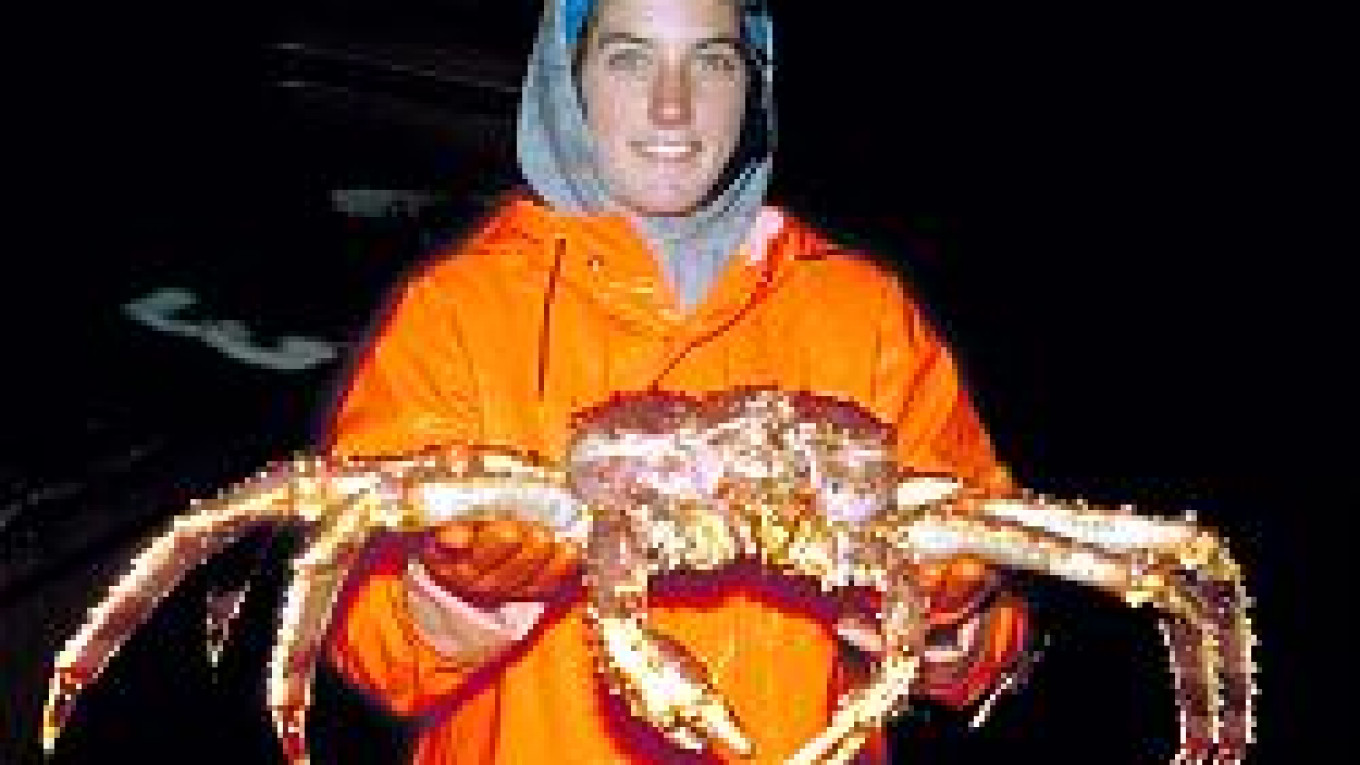An estimated 12 million king crabs, descendants of stock brought from the Pacific Ocean under a Stalin-era scheme, are scuttling into the Atlantic after a mystery crustacean population explosion off northern Russia.
The crabs, originally an experimental food source for the barren northwest Soviet Union, have ravaged their way about 500 kilometers along Norway's Arctic coast in just 10 years.
No one knows how far south the seabed stormtroopers, some more than a meter from claw-tip to claw-tip, will advance before the water gets too warm or they run into tougher predators.
"Estimates for the potential southward limit for the species range between Lofoten [just inside the Arctic Circle in Norway], the North Sea basin and Portugal," the WWF environmental group said in a report.
The WWF suggests a fishing free-for-all to stop the crabs, a delicacy known as Kamchatka crabs or Red King Crabs. The WWF also wants the United Nations, via its Convention on Biological Diversity, to put pressure on Oslo to halt the crawl.
Norwegian officials dismiss suggestions that the crabs might sometime be slicing off the toes of bathers as far south as the Algarve after conquering beaches in Sweden and Spain, with side trips to Britain, Ireland and the Baltic Sea. "Lofoten is likely to be the limit but it is very difficult to say," said Aasmund Bjordal, chief researcher at the state-run Norwegian Institute of Marine Research.
He said the crabs liked icy waters and that cod, catfish and even seals preyed on the soft-skinned young crabs before they develop the armored shells of the adult. The biggest crabs weigh about 10 kilograms.
In the Pacific, where environmentalists say seabed competition is tougher, the crabs have ventured as far south as Canada's Vancouver Island and northern Japan. "It's more likely that the crabs will go north than south," said Jan Sundet, a senior researcher and leading crab expert at the institute. The crabs venture into shallow water to mate in spring but lurk in deeper waters most of the year.
Yury Orlov, a Russian who helped transport crabs by plane and train from the Pacific, reckons the species could reach the mouth of the Mediterranean. "It will keep going as far as Gibraltar," he told the Norwegian daily Aftenposten.
Orlov led a project to bring 2,000 female crabs, 1,000 males and 10,000 young from the Pacific in the 1960s. No one knows what caused the population to rocket in the 1990s.
The crab plan was launched under Stalin in the 1930s. Most died on early trips until Orlov hit on a survival of the fittest test -- meaning the new crab stock may be even tougher than their Pacific cousins. "I put the crabs on their backs and if they managed to turn over quickly, they were strong enough to make the trip," he said.
Bjoern Bye, a crab fisherman in the Norwegian Arctic port of Kirkenes, has a word of advice. "They're easy to handle but don't put your fingers near their claws," he said. "I don't think they could cut off a finger but they can give a deep cut."
Some Norwegian fishermen hate the crabs for ripping their nets while others welcome them as a new source of income -- crab meat sells for 400 crowns ($58) per kilogram in Oslo shops.
"We have to stop seeing the crabs as a plague and see them as a resource," said Norway's fisheries minister, Svein Ludvigsen. He said the crabs were popular with gourmets in Japan.
Norway and Russia have doubled quotas to a total of 800,000 crabs for 2003 from 400,000 in 2002, when catches were first allowed off Norway. Oslo also plans to fix a maximum southern limit beyond which fishing will be a free-for-all. The WWF wants more drastic measures, fearing the crabs may usurp native Arctic species. "Norway should allow free catches of the crabs everywhere all year round, with subsidies if needed," said Rasmus Hansson, head of the WWF in Norway. "The problem is that there are no real predators for the crabs in the western Arctic, where the crabs are a much bigger and more powerful than any bottom-living organism," he said. Several species of giant crab compete in the Pacific.
Ludvigsen said it would be impossible to exterminate the crabs -- even using poisons -- and that they were introduced decades before the convention was agreed in 1992. Other officials say eradicating the crabs would be like trying to oust rainbow trout, introduced to European rivers from North America. Many species are nonnatives; potatoes and tomatoes spread to Europe from South America in the 16th century.
Fisherman Bye shrugged off the disputes. "The crabs can be a pest, but they're easy to catch," he said.
A Message from The Moscow Times:
Dear readers,
We are facing unprecedented challenges. Russia's Prosecutor General's Office has designated The Moscow Times as an "undesirable" organization, criminalizing our work and putting our staff at risk of prosecution. This follows our earlier unjust labeling as a "foreign agent."
These actions are direct attempts to silence independent journalism in Russia. The authorities claim our work "discredits the decisions of the Russian leadership." We see things differently: we strive to provide accurate, unbiased reporting on Russia.
We, the journalists of The Moscow Times, refuse to be silenced. But to continue our work, we need your help.
Your support, no matter how small, makes a world of difference. If you can, please support us monthly starting from just $2. It's quick to set up, and every contribution makes a significant impact.
By supporting The Moscow Times, you're defending open, independent journalism in the face of repression. Thank you for standing with us.
Remind me later.


